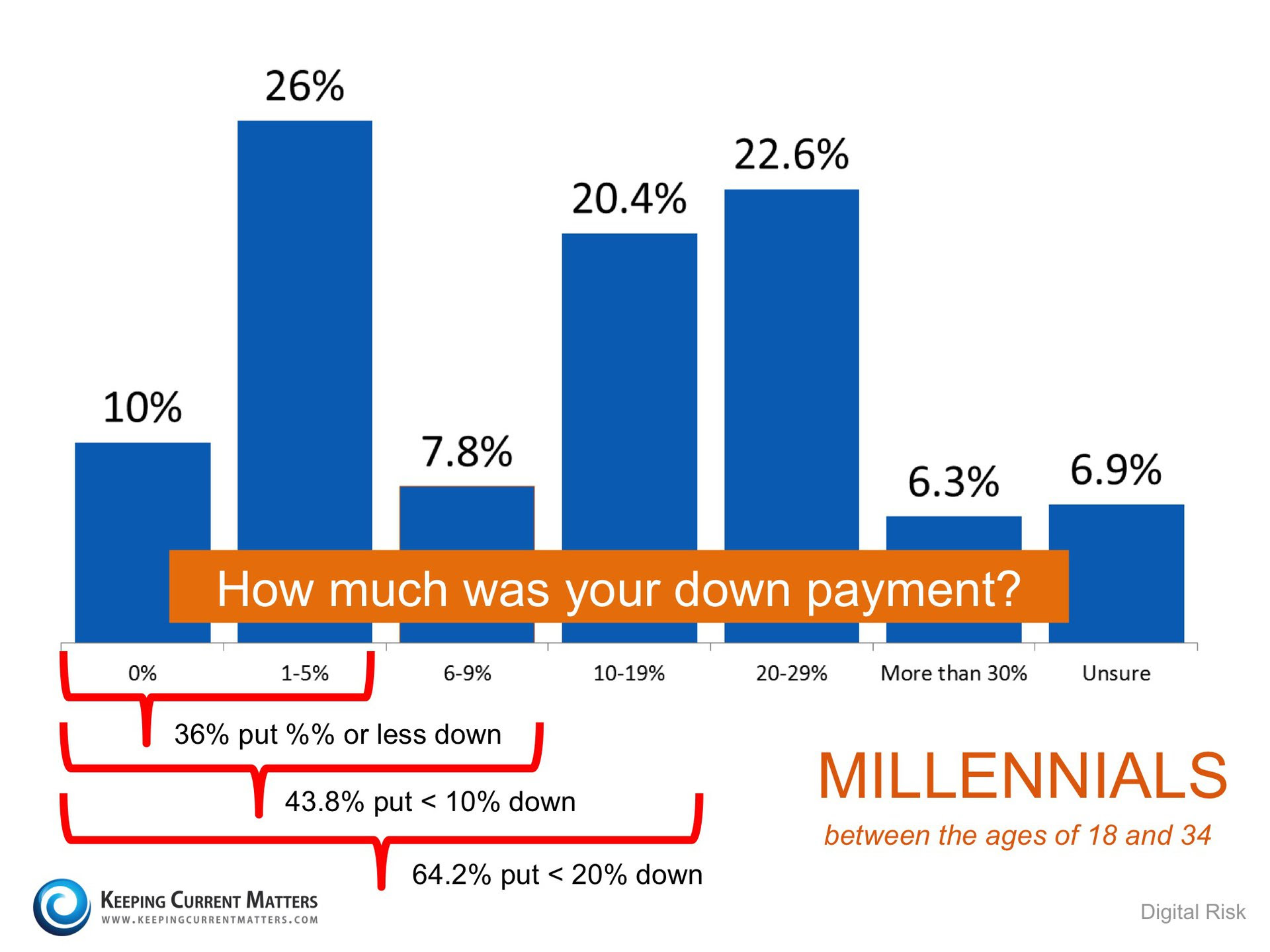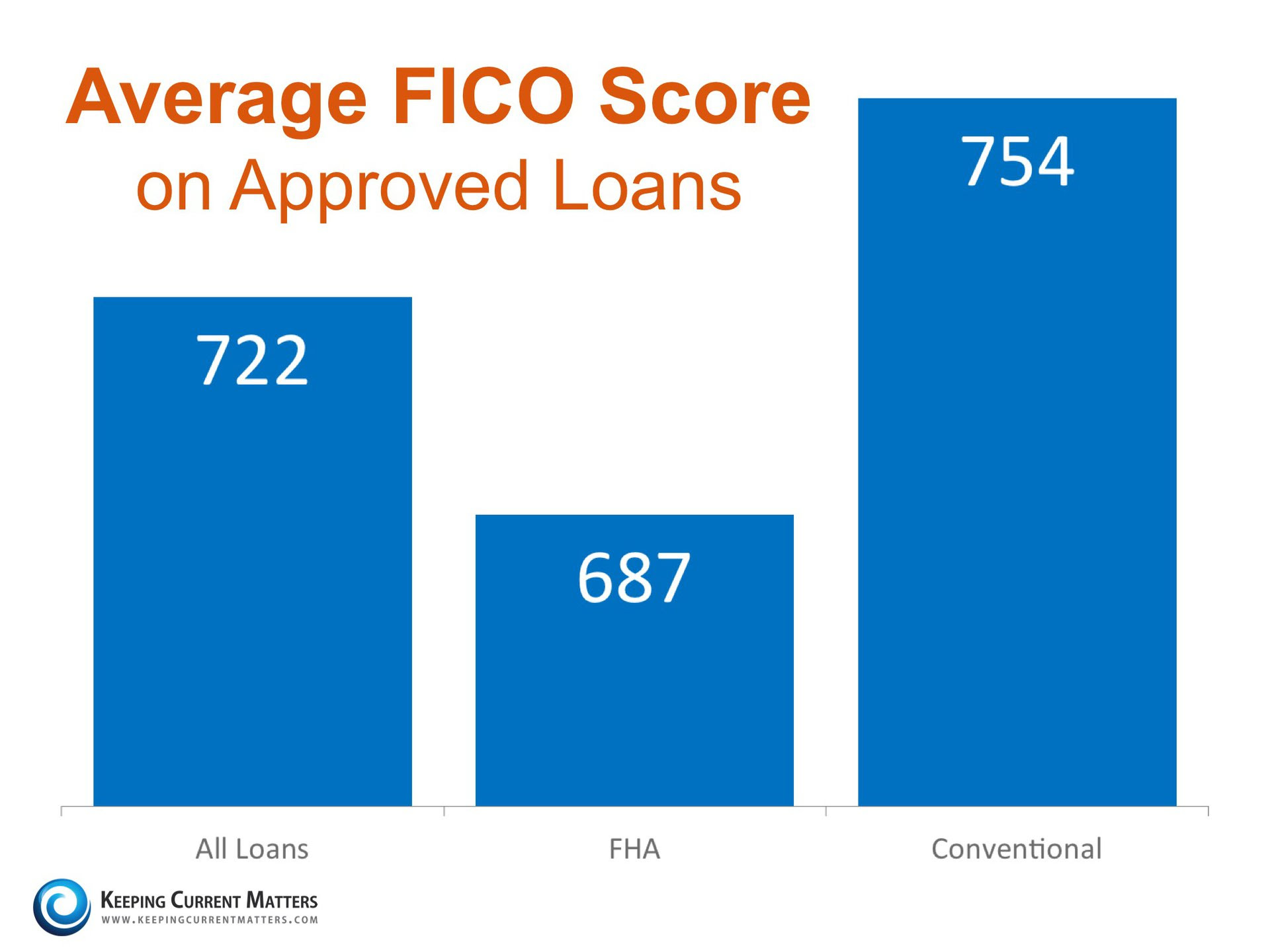  What You Really Need To Qualify For A Mortgage
| ||||||||||||
Thursday, December 17, 2015
Friday, December 11, 2015
HFF Closes Sale of 6-Property, Multi-State Seniors Housing Portfolio
DALLAS--(BUSINESS WIRE)--Holliday Fenoglio Fowler, L.P. (HFF) announced today that it has closed the sale of a six-property seniors housing portfolio totaling 596 units located in Southern California, Michigan, Philadelphia and Washington, D.C.
HFF marketed the portfolio exclusively on behalf of the seller, a joint venture between The Carlyle Group and Capitol Seniors Housing. ROC Seniors Housing Fund Manager, LLC acquired the portfolio free and clear of existing debt.
The portfolio has 114 independent living, 329 assisted living, 136 memory care and 17 skilled nursing units. The properties in the portfolio are: Crown Cove in Corona Del Mar, California; Raincross at Riverside in Riverside, California; Whittier Place in Whittier, California; Regent Street of West Bloomfield in West Bloomfield, Michigan; Arbor Terrace at Chestnut Hill in Philadelphia, Pennsylvania; and The Residences at Thomas Circle in Washington, D.C. The portfolio is 89.1 percent leased overall.
The HFF investment sales team representing the seller was led by managing directors Ryan Maconachy and Chad Lavender along with senior managing director Gerry Rohm.
About The Carlyle Group
The Carlyle Group (Carlyle) is a global alternative asset manager with $188 billion of assets under management across 126 funds and 160 fund of funds vehicles. Founded in 1987 in Washington, D.C., Carlyle has grown into one of the world’s largest and most successful investment firms, with more than 1,700 professionals operating in 35 offices in North America, South America, Europe, the Middle East, North Africa, Sub-Saharan Africa, Japan, Asia and Australia.
About Capitol Seniors Housing
Capitol Seniors Housing (CSH) is a boutique real estate private equity group focusing exclusively on the seniors housing sector. Since its inception in 2003, it has successfully acquired or developed more than 60 seniors housing communities throughout the continental U.S. CSH is a joint venture operating partner with The Carlyle Group, the $188 billion global alternative asset manager based in Washington, D.C. and one of the largest university endowments in the United States. The company utilizes third party seniors housing operating companies to manage the day-to-day oversight of its communities. By year’s end, CSH will have 25 operational communities nationwide and $750 million in assets under management in its portfolio. CSH headquarters are located on Pennsylvania Avenue in Washington, D.C.
About ROC Seniors Housing Fund Manager, LLC
ROC Seniors Housing Fund Manager, LLC (ROC Seniors) is a fund manager for a family of private equity funds that focus on investments in seniors housing communities and healthcare properties. The principals have over $6 billion of investment experience in these sectors. ROC Seniors currently has over $1.1 billion of regulatory assets under management (RAUM) with 41 properties. ROC Seniors is a subsidiary of Bridge Investment Group Partners, LLC (“Bridge-IGP”), a registered investment adviser. Bridge-IGP and ROC Seniors are integrated investment advisers under the Investment Advisers Act of 1940. Bridge-IGP, headquartered in Salt Lake City, Utah, has over $4.3 billion of RAUM and its affiliates own/manage an additional $400 million in real estate assets.
About HFF
HFF and HFFS (HFF Securities L.P.) are owned by HFF, Inc. (NYSE: HF). HFF operates out of 22 offices nationwide and is a leading provider of commercial real estate and capital markets services to the U.S. commercial real estate industry. HFF together with its affiliate HFFS offer clients a fully integrated national capital markets platform including debt placement, investment sales, equity placement, advisory services, loan sales and commercial loan servicing. For more information please visit hfflp.com or follow HFF on Twitter @HFF.
Holliday Fenoglio Fowler, L.P., acting by and through Holliday GP Corp., a real estate broker licensed with the California Department of Real Estate, License Number 01385740.
Tuesday, December 8, 2015
The Impact of Higher Interest Rates
 Last week, an article in the Washington Post discussed a new ‘threat’ homebuyers will soon be facing: higher mortgage rates. The article revealed:
Last week, an article in the Washington Post discussed a new ‘threat’ homebuyers will soon be facing: higher mortgage rates. The article revealed:“The Mortgage Bankers Association expects that rates on 30-year loans could reach 4.8 percent by the end of next year, topping 5 percent in 2017. Rates haven’t been that high since the recession.”
How can this impact the housing market?
The article reported that recent analysis from Realtor.com found that -“…as many as 7% of people who applied for a mortgage during the first half of the year would have had trouble qualifying if rates rose by half a percentage point.”This doesn’t necessarily mean that those buyers negatively impacted by a rate increase would not purchase a home. However, it would mean that they would either need to come up with substantially more cash for a down payment or settle for a lesser priced home. Below is a table showing how a jump in mortgage interest rates would impact the purchasing power of a prospective buyer on a $300,000 home.
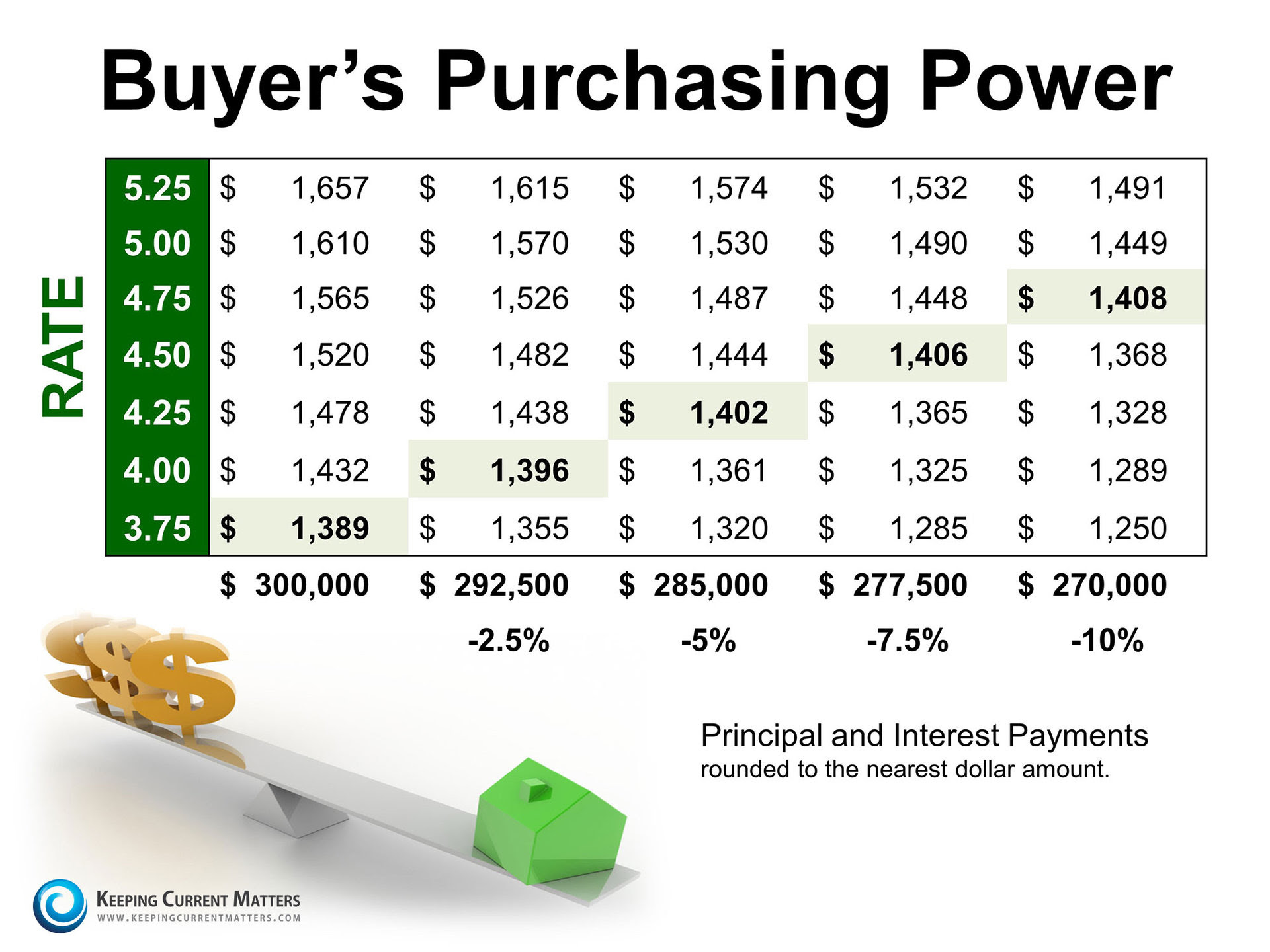
Saturday, December 5, 2015
Thursday, December 3, 2015
Prices & Mortgage Rates Going Up in 2016
 The monthly mortgage payment on a home is determined by two elements: the price of the house and the interest rate you pay on your mortgage. Recently released reports are revealing that the experts expect both elements to increase in 2016.
The monthly mortgage payment on a home is determined by two elements: the price of the house and the interest rate you pay on your mortgage. Recently released reports are revealing that the experts expect both elements to increase in 2016.HOME PRICES
CoreLogic has projected a nationwide 5.2% home value appreciation for the next twelve months. Here is their breakdown by state: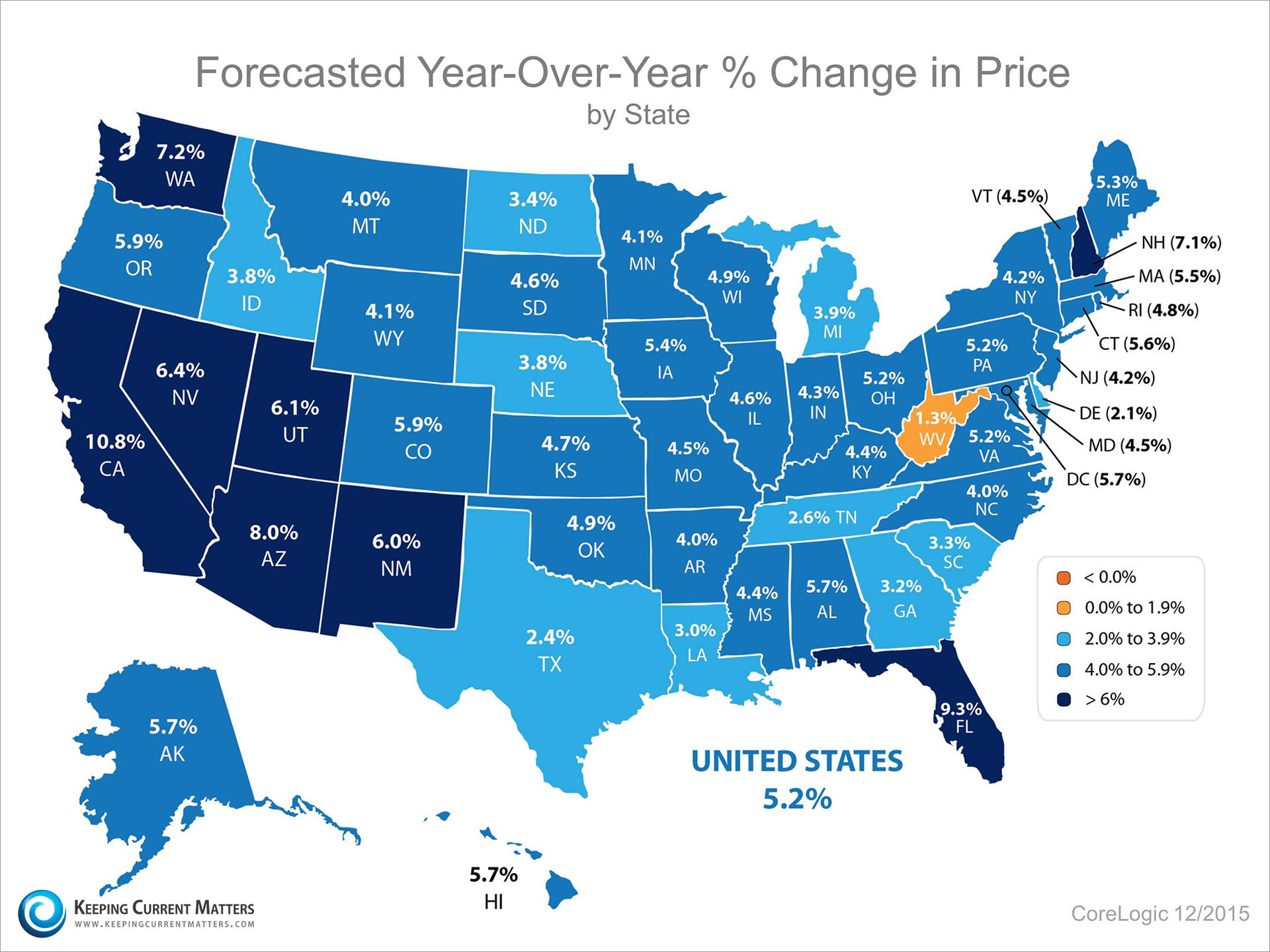
MORTGAGE INTEREST RATES
All four of the entities that provide projections on mortgage interest rates agree: they’re going up in 2016. Here are the predictions over the next four quarters: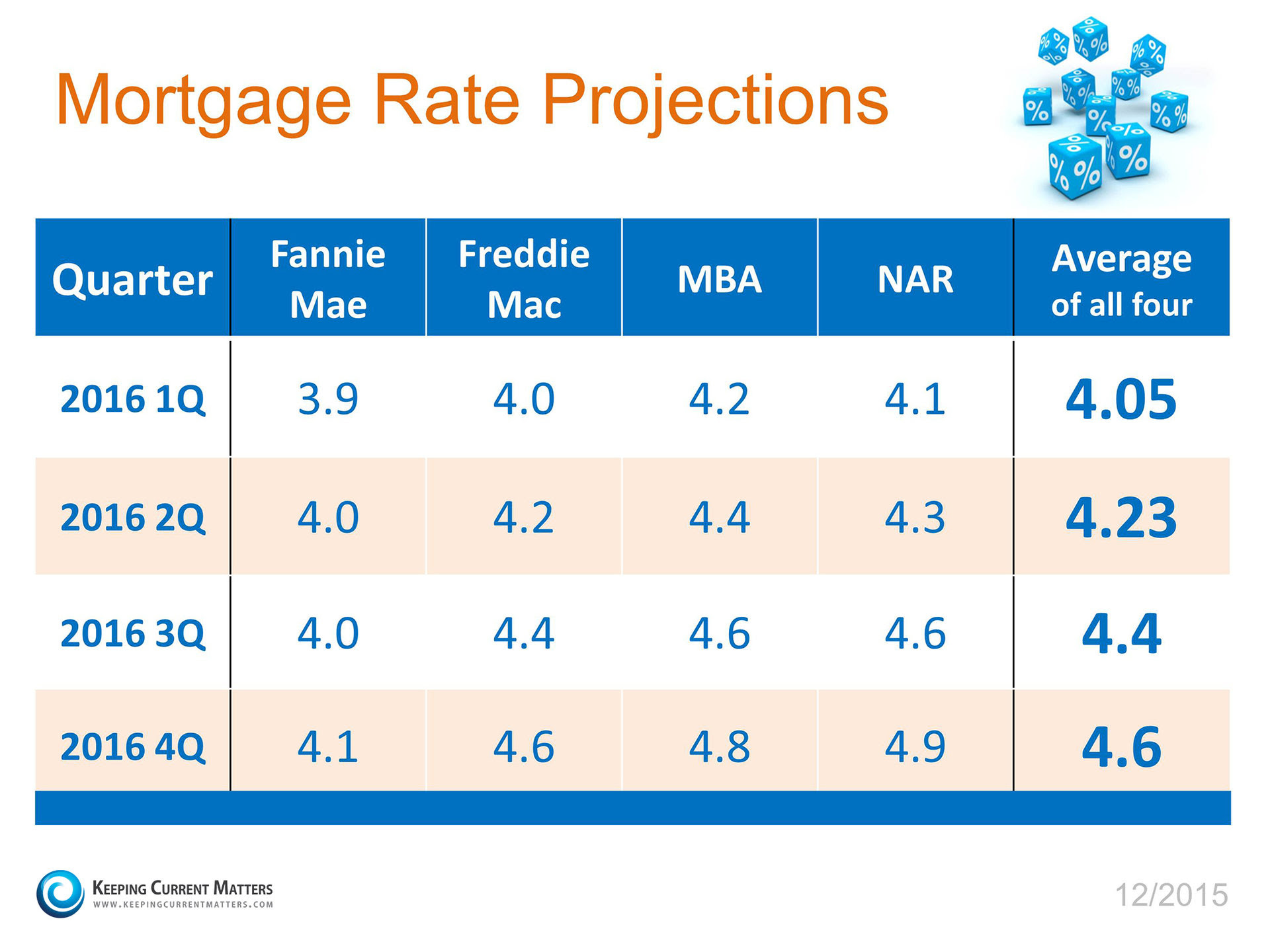
Bottom Line
With both home values and interest rates projected to increase over the next twelve months, buying (or moving-up), sooner rather than later, makes sense.Wednesday, December 2, 2015
7 Threats to Your Home and What You Can Do to Prevent Them
What do mold, pests, old windows, leaky toilets and carbon monoxide have in common? They are all silent, and often hidden, dangers capable of causing significant damage to your home. But just because they're out of sight doesn't mean they should be out of mind.
When you bought your home, you had it inspected. The question is: How thorough of an inspection did it receive? If this was your first house; if you followed advice from friends, family or your realtor; or if you didn't perform the proper due diligence, you may not have received the home inspection you thought you did.
Many homeowners are under the false impression that a home inspector inspects every element of the home. In fact, unless you add it to the inspection (i.e., pay for it yourself), inspectors typically do not check for asbestos, radon gas, lead paint, toxic mold and/or pests. Left unmitigated, these contaminants can cause serious damage to your house and your health.
If you suspect that your home is at risk, we recommend meeting with a specialist. In addition to inspecting your home for contaminants, a specialist will identify the best course of action to remove any offending contaminants from your home
Many homeowners are under the false impression that a home inspector inspects every element of the home. In fact, unless you add it to the inspection (i.e., pay for it yourself), inspectors typically do not check for asbestos, radon gas, lead paint, toxic mold and/or pests. Left unmitigated, these contaminants can cause serious damage to your house and your health.
If you suspect that your home is at risk, we recommend meeting with a specialist. In addition to inspecting your home for contaminants, a specialist will identify the best course of action to remove any offending contaminants from your home
Home experts advise that you replace your windows every 25 years. And while you likely already know why you should replace them, you also know how expensive it can be. However, the benefits of replacing your windows could be reason enough to make you reconsider putting it off.
First, new windows improve the look of your home. Granted, this might not be something you're overly concerned about, but it is something appraisers, and potential buyers, will keep in mind - especially if you're the only house in your neighborhood without new windows. Why is this important? Because improved looks usually correlate to improved home values.
Second, new windows improve the comfort of your home. Old, single-pane windows are drafty, poorly insulated, vulnerable to condensation and often borderline inoperable. If you are tired of dealing with any one of the above, new windows are the solution.
Finally, new windows improve your home's energy efficiency. The obvious payback here is decreased utility bills. How much you save will depend on how efficient the windows are. However, this alone is not reason enough to replace all of your windows. Even if they reduce your utility bill $500 per year, you're still looking at a payback period of nearly 10 years.
So, why replace your windows? Because you want to improve the look, comfort and efficiency of your home. If that's not reason enough, what is?
First, new windows improve the look of your home. Granted, this might not be something you're overly concerned about, but it is something appraisers, and potential buyers, will keep in mind - especially if you're the only house in your neighborhood without new windows. Why is this important? Because improved looks usually correlate to improved home values.
Second, new windows improve the comfort of your home. Old, single-pane windows are drafty, poorly insulated, vulnerable to condensation and often borderline inoperable. If you are tired of dealing with any one of the above, new windows are the solution.
Finally, new windows improve your home's energy efficiency. The obvious payback here is decreased utility bills. How much you save will depend on how efficient the windows are. However, this alone is not reason enough to replace all of your windows. Even if they reduce your utility bill $500 per year, you're still looking at a payback period of nearly 10 years.
So, why replace your windows? Because you want to improve the look, comfort and efficiency of your home. If that's not reason enough, what is?
If your water heater is older than 10 years old, doesn't heat efficiently or requires constant repair, it could be time to replace it. Thankfully, a new water heater isn't nearly as expensive as new windows. According to our True Cost Guide, the average replacement cost comes in at just under $1,000. When you compare that against the average repair cost of $516, you can quickly see why, in most cases, it's better to replace than repair. Need a new water heater?
According to the National Fire Protection Association, approximately 14,000 fires are caused each year by improper dryer ventilation and maintenance. Many of those fires can be traced back to lint accumulation. You might be wondering how that's possible given that you make it a point to clean out your dryer's lint trap. The problem is that you're neglecting to properly clean out your dryer's exhaust vent — that tube that snakes from your dryer to the outside of your house. Over time, lint buildup can restrict airflow and increase the temperatures in the dryer, leading to increased fire danger
Termites cause billions of dollars of damage each year before unsuspecting homeowners even know what hit them. The good news is there are steps you can take to protect your home from these irksome pests. The bad news is you probably won't know you have a problem until the termites are already well established. If you live in an area that is prone to termites, or if you suspect that your home has termite damage, consult a pest specialist to see what you should do.
Did you know that, on average, leaks account for 10,000 gallons of wasted water each year? That's enough to fill a swimming pool. So, what part of your home is responsible for the greatest amount of water waste? If you said toilet, you pass. In fact, if your toilet is constantly running you could be blowing through 200 or more gallons of water per day. That's 73,000 gallons of water! Do the math and you'll quickly see how much that adds to your water bill. Thankfully, fixing your leaky pipes is as easy as hiring a plumber
Carbon monoxide, or CO, is often called the silent killer as this odorless, colorless gas can cause sudden illness and death. It's a gas that nearly every homeowner is aware of, yet far too many either ignore the risks it poses or are unaware of their home's vulnerabilities. Fortunately, there are a few things you can do to protect your home and family — the easiest of which is installing carbon monoxide detectors and ensuring the proper function of your gas, oil and charcoal burning appliances. Want to make sure you're protected? Talk to a fire protection and prevention specialist.
If you need recommendations for any of these issues please feel free to contact me!! Wendy 562 243 2966 or wendy@wendyj4homes.com
Sunday, November 29, 2015
Selling Your Home? The Importance of Using a Real Estate Professional
 When a homeowner decides to sell their house, they obviously want the best possible price with the least amount of hassles. However, for the vast majority of sellers, the most important result is to actually get the home sold. In order to accomplish all three goals, a seller should realize the importance of using a real estate professional. We realize that technology has changed the purchaser’s behavior during the home buying process. For the past three years, 92% of all buyers have used the internet in their home search according to the National Association of Realtors’ most recent Profile of Home Buyers & Sellers. However, the report also revealed that 95% percent of buyers that used the internet when searching for a home purchased their home through either a real estate agent/broker or from a builder or builder’s agent. Only 2% purchased their home directly from a seller whom the buyer didn’t know. Buyers search for a home online but then depend on an agent to find the actual home they will buy (53%) or negotiate the terms of the sale & price (48%) or understand the process (60%). The plethora of information now available has resulted in an increase in the percentage of buyers that reach out to real estate professionals to “connect the dots”. This is obvious, as the percentage of overall buyers who used an agent to buy their home has steadily increased from 69% in 2001.
When a homeowner decides to sell their house, they obviously want the best possible price with the least amount of hassles. However, for the vast majority of sellers, the most important result is to actually get the home sold. In order to accomplish all three goals, a seller should realize the importance of using a real estate professional. We realize that technology has changed the purchaser’s behavior during the home buying process. For the past three years, 92% of all buyers have used the internet in their home search according to the National Association of Realtors’ most recent Profile of Home Buyers & Sellers. However, the report also revealed that 95% percent of buyers that used the internet when searching for a home purchased their home through either a real estate agent/broker or from a builder or builder’s agent. Only 2% purchased their home directly from a seller whom the buyer didn’t know. Buyers search for a home online but then depend on an agent to find the actual home they will buy (53%) or negotiate the terms of the sale & price (48%) or understand the process (60%). The plethora of information now available has resulted in an increase in the percentage of buyers that reach out to real estate professionals to “connect the dots”. This is obvious, as the percentage of overall buyers who used an agent to buy their home has steadily increased from 69% in 2001.Bottom Line
If you are thinking of selling your home, don’t underestimate the role a real estate professional can play in the process.Tuesday, November 24, 2015
Millennials: What FICO Score is Needed to Buy a Home?
 In a recent article by the Wharton School of Business at the University of Pennsylvania, it was revealed that some Millennials are not looking to purchase a home simply because they don’t believe they can qualify for a mortgage. The article quoted Jessica Lautz, the National Association of Realtors’ Managing Director of Survey Research, as saying that there is a significant population that does not think they will be approved for a mortgage and doesn’t even try. The article also quoted Fannie Mae CEO Tim Mayopoulos :
In a recent article by the Wharton School of Business at the University of Pennsylvania, it was revealed that some Millennials are not looking to purchase a home simply because they don’t believe they can qualify for a mortgage. The article quoted Jessica Lautz, the National Association of Realtors’ Managing Director of Survey Research, as saying that there is a significant population that does not think they will be approved for a mortgage and doesn’t even try. The article also quoted Fannie Mae CEO Tim Mayopoulos :“I do think that there’s a sense out there in the marketplace among borrowers that credit may not be available, especially for people with lower credit scores.”
So what credit score is necessary?
A recent survey reported that two-thirds of the respondents believe they need a very good credit score to buy a home, with 45 percent thinking a “good credit score” is over 780. In actually, the FICO score on closed loans (as reported by Ellie Mae) is much lower and has been dropping over the last several months.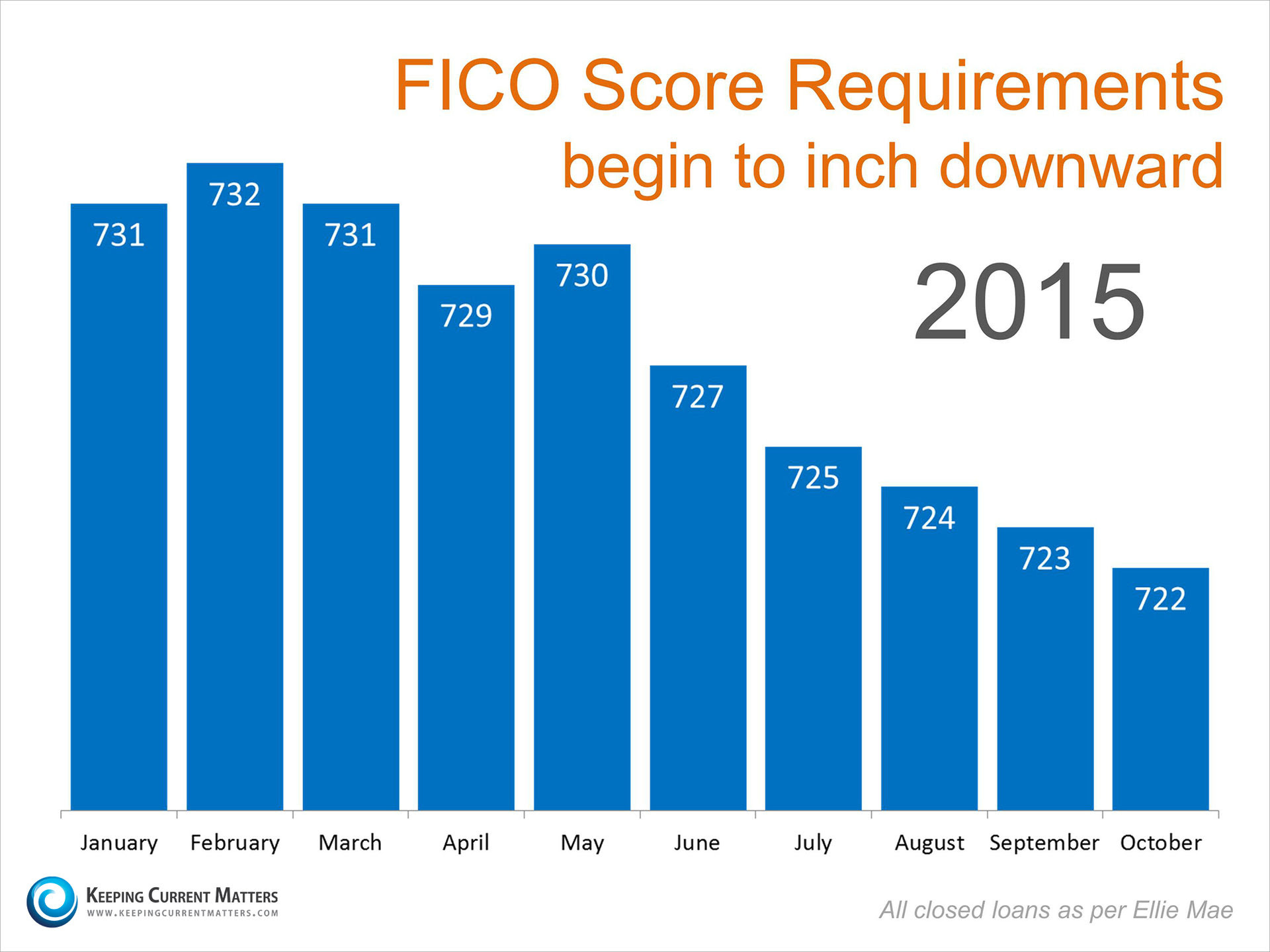
Bottom Line
Millennials who are considering a home purchase should get advice from a local real estate or mortgage professional now. They may be surprised how much the requirements for a mortgage have eased.Thursday, November 19, 2015
Should I Pay a Mortgage Interest Rate over 4%?
 Mortgage interest rates, as reported by Freddie Mac, have increased over the last several weeks. Along with Freddie Mac, Fannie Mae, the Mortgage Bankers Association and the National Association of Realtors are all calling for mortgage rates to continue to rise over the next four quarters. This has caused some purchasers to lament the fact they may no longer be able to get a rate less than 4%. However, we must realize that current rates are still at historic lows. Here is a chart showing the average mortgage interest rate over the last several decades.
Mortgage interest rates, as reported by Freddie Mac, have increased over the last several weeks. Along with Freddie Mac, Fannie Mae, the Mortgage Bankers Association and the National Association of Realtors are all calling for mortgage rates to continue to rise over the next four quarters. This has caused some purchasers to lament the fact they may no longer be able to get a rate less than 4%. However, we must realize that current rates are still at historic lows. Here is a chart showing the average mortgage interest rate over the last several decades.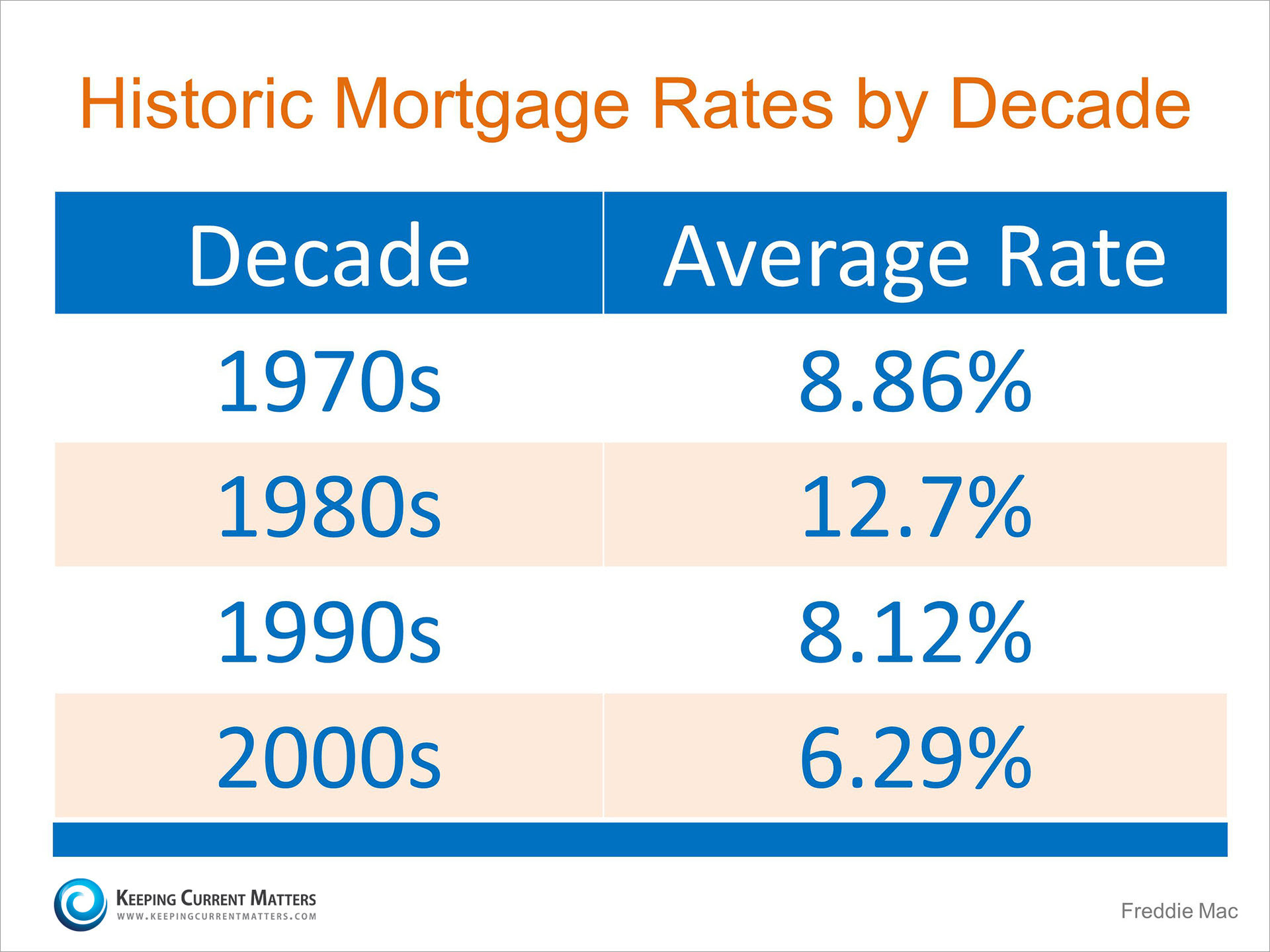
Bottom Line
Though you may have missed getting the lowest mortgage rate ever offered, you can still get a better interest rate than your older brother or sister did ten years ago; a lower rate than your parents did twenty years ago and a better rate than your grandparents did forty years ago.Wednesday, November 18, 2015
Getting The Most $$'s For Your Home
 Every homeowner wants to make sure they maximize the financial reward when selling their home. But, how do you guarantee that you receive maximum value for your house? Here are two keys to insuring you get the highest price possible.
Every homeowner wants to make sure they maximize the financial reward when selling their home. But, how do you guarantee that you receive maximum value for your house? Here are two keys to insuring you get the highest price possible.1. Price it a LITTLE LOW
This may seem counterintuitive. However, let’s look at this concept for a moment. Many homeowners think that pricing their home a little OVER market value will leave them room for negotiation. In actually, this just dramatically lessens the demand for your house. (see chart)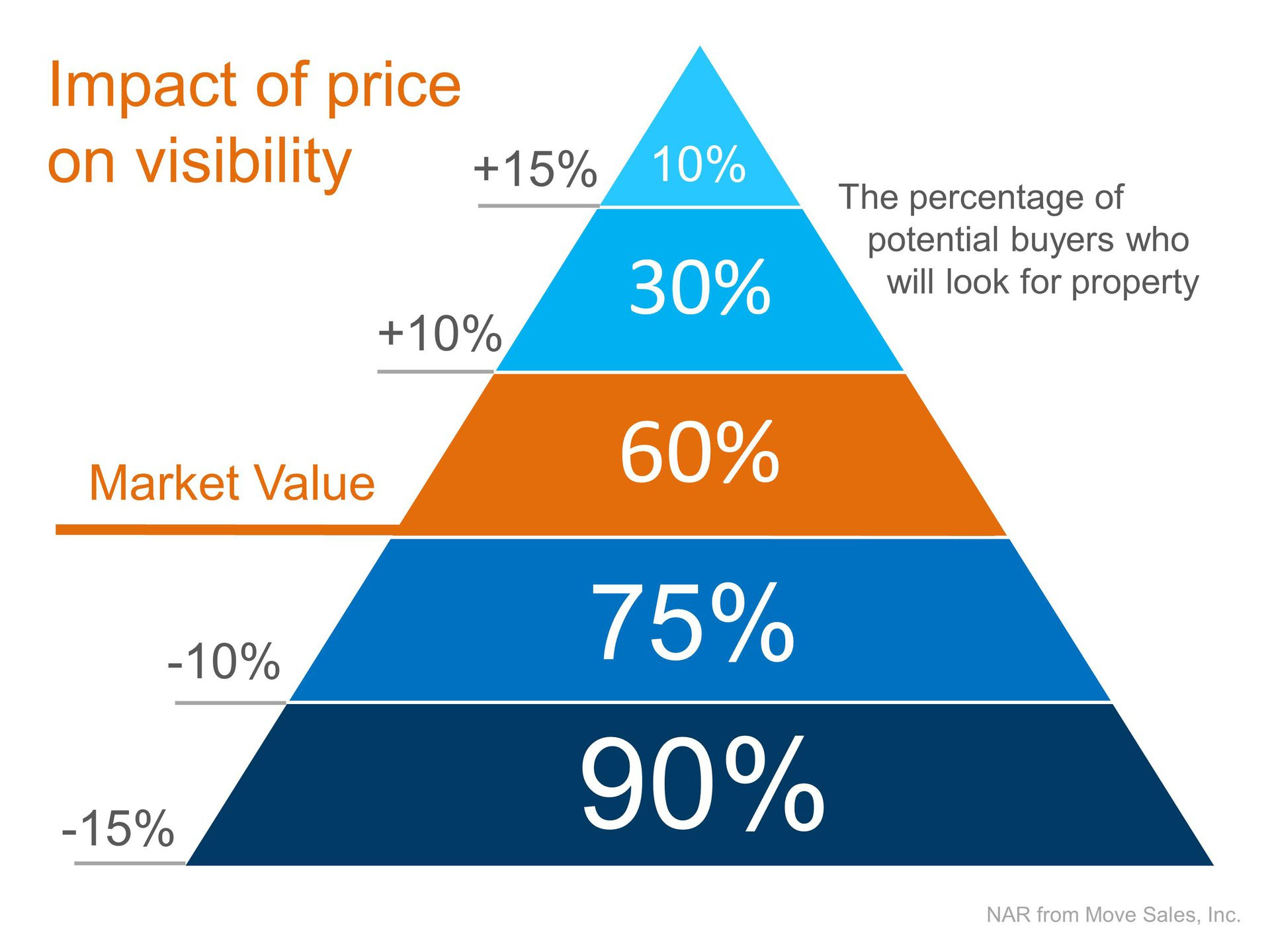 Instead of the seller trying to ‘win’ the negotiation with one buyer, they should price it so demand for the home is maximized. In that way, the seller will not be fighting with a buyer over the price but instead will have multiple buyers fighting with each other over the house. In a recent article on realtor.com, they gave this advice:
Instead of the seller trying to ‘win’ the negotiation with one buyer, they should price it so demand for the home is maximized. In that way, the seller will not be fighting with a buyer over the price but instead will have multiple buyers fighting with each other over the house. In a recent article on realtor.com, they gave this advice:“Aim to price your property at or just slightly below the going rate. Today’s buyers are highly informed, so if they sense they’re getting a deal, they’re likely to bid up a property that’s slightly underpriced, especially in areas with low inventory.”
2. Use a Real Estate Professional
This too may seem counterintuitive. The seller may think they would net more money if they didn’t have to pay a real estate commission. Yet, studies have shown that typically homes sell for more money when handled by a real estate professional. Recent research posted by the Economists’ Outlook Blog revealed:“The median selling price for all FSBO homes was $210,000 last year. When the buyer knew the seller in FSBO sales, the number sinks to the median selling price of $151,900. However, homes that were sold with the assistance of an agent had a median selling price of $249,000 – nearly $40,000 more for the typical home sale.”
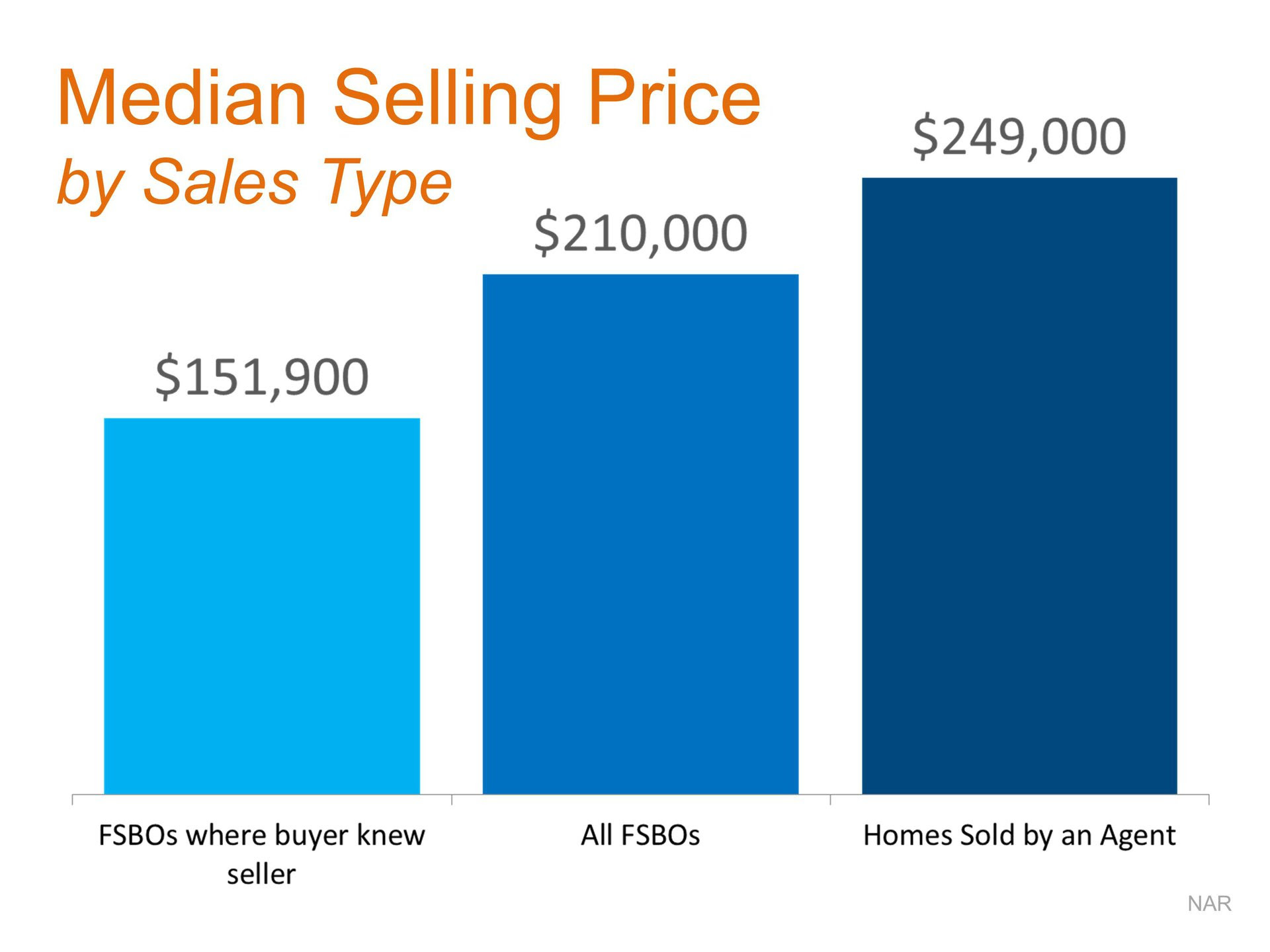
Bottom Line
Price it at or slightly below the current market value and hire a professional. That will guarantee you maximize the price you get for your house.Monday, November 9, 2015
Budget Bathroom Makeovers
If a major bathroom remodel isn't in your budget, simply updating a smaller aspect of your bathroom can make a significant impact. New tile, cabinets, lighting or plumbing fixtures can give the room a whole new style. Update the walls with a fresh coat of paint or use drywall to provide texture for a faux look. To keep up with recent trends, some people are even updating their electrical systems to accommodate in-bathroom TVs, stereos and towel warmers.
To get the most out of your makeover, keep in mind how you use your bathroom and choose projects that will positively affect your daily routine. The key to a small bathroom makeover is to pick one or two projects and focus all of your creativity and budget on those.
Boost a neutral bathroom with brightly colored tile. If tiling your entire bathroom is out of the question, mix and match tile colors above the sink or bathtub to create your own mosaic. Consider choosing a colorful grout to further customize your creation.
Bring old cabinets back to life by restaining, painting or refacing them. Or, replace them altogether with new cabinets. While bathroom cabinets can help set the tone of the room, they also need to be functional. Choose cabinets that provide adequate storage or add additional shelving to your current cabinets.
Swap out your old light fixtures for fixtures that will allow for softer light for relaxing evenings in the tub and brighter light for getting ready in the morning.
Nothing dates a bathroom like a dingy, basic 1970s chrome faucet. Today's faucets have become the inspiration for the entire bathroom. From elegant waterfall to traditional fixtures, chrome to brass, there are more options to choose from than ever before.
The simplest—and most inexpensive—way to update any room is to tackle those walls. The small space is the perfect place to try a bold color or bright shade that might elsewhere overwhelm your home.
People are spending more and more time in their bathrooms these days—relaxing, rejuvenating and just hiding away. And now there are many bathroom uses for an electrical outlet. Consider upgrading your electrical system to allow for entertainment (TVs and stereos) and relaxation (jetted foot tubs and facial saunas).
Saturday, November 7, 2015
Lighting design is the planning of a lighting system to achieve an optimal lighting effect in a given space. The process may include landscape lighting, exterior architectural lighting, improving the lighting in a specific room or area, or designing the lighting for an entire home remodel or new home build.
A competent lighting designer will be able to determine your lighting needs based on your tastes, décor, personal habits, use of space and budget. And he or she will be able to provide you with a custom, personalized lighting plan to meet those needs. Even if you only want to add a couple of lights as do-it-yourself project, you can still benefit from the specialized knowledge and advice of an expert.
A competent lighting designer will be able to determine your lighting needs based on your tastes, décor, personal habits, use of space and budget. And he or she will be able to provide you with a custom, personalized lighting plan to meet those needs. Even if you only want to add a couple of lights as do-it-yourself project, you can still benefit from the specialized knowledge and advice of an expert.
If you're undertaking a major home remodel or a new home build, then it is wise to search out a lighting designer that you're comfortable with during the early planning stages. Lighting is one of the most important aspects of a home, inside and out, and a good lighting specialist will be able to offer you valuable, and innovative, ideas that may be incorporated into the structural design of your home. The other reason you want to incorporate a lighting designer into your plans early on is that every aspect of design, from electrical wiring to installing fixtures, is easier to do in the early stages of construction. Waiting to do your lighting until after the major building is finished will mean a lot more extensive work later on, and from a budgetary perspective, it will have a much bigger impact on your wallet too.
When it comes to designing lighting, there are several things that you, as a homeowner, should keep in mind before you hire out any major projects. Those include:
Natural light should be utilized whenever possible for a number of reasons. It's more economical and generally more pleasant. And, if you're in the middle of a major remodel or designing a new home, there are some stunning uses of natural light that can easily be incorporated into your overall architectural design.
Consider task lighting, accent lighting and ambient light. Task lighting focuses on specific work areas, such as countertops and tables. Accent lighting lights up areas of your home that you want to draw special attention to, such as architectural areas, artwork, and stairways. Ambient light refers to general lighting, such as lighting you'd find in general living areas and kitchens.
Recessed lighting is all the rage, and it works for just about any application you can think of. It can also be used as task, accent or ambient lighting, depending on the specific needs of the area. Track lighting is also popular these days, and it's especially effective when used to accent and bring focus to certain areas, architectural designs or artwork.
Look around and start paying attention to lighting solutions that you like and appreciate. Also, take note of lighting that you're not so keen on. When you sit down with your designer, you will be able to discuss what you like and what you don't. Finally, above all else, make sure your lighting plan is functional. Good lighting design isn't worth the money spent if it's more of a hassle to operate than it is to enjoy. A sound lighting plan is an investment that will pay off in satisfaction and convenience for years to come.
Subscribe to:
Comments (Atom)

 A recent survey by Ipsosfound that the American public is still somewhat confused about what is actually necessary to qualify for a home mortgage loan in today’s housing market. The study pointed out two major misconceptions that we want to address today.
A recent survey by Ipsosfound that the American public is still somewhat confused about what is actually necessary to qualify for a home mortgage loan in today’s housing market. The study pointed out two major misconceptions that we want to address today.